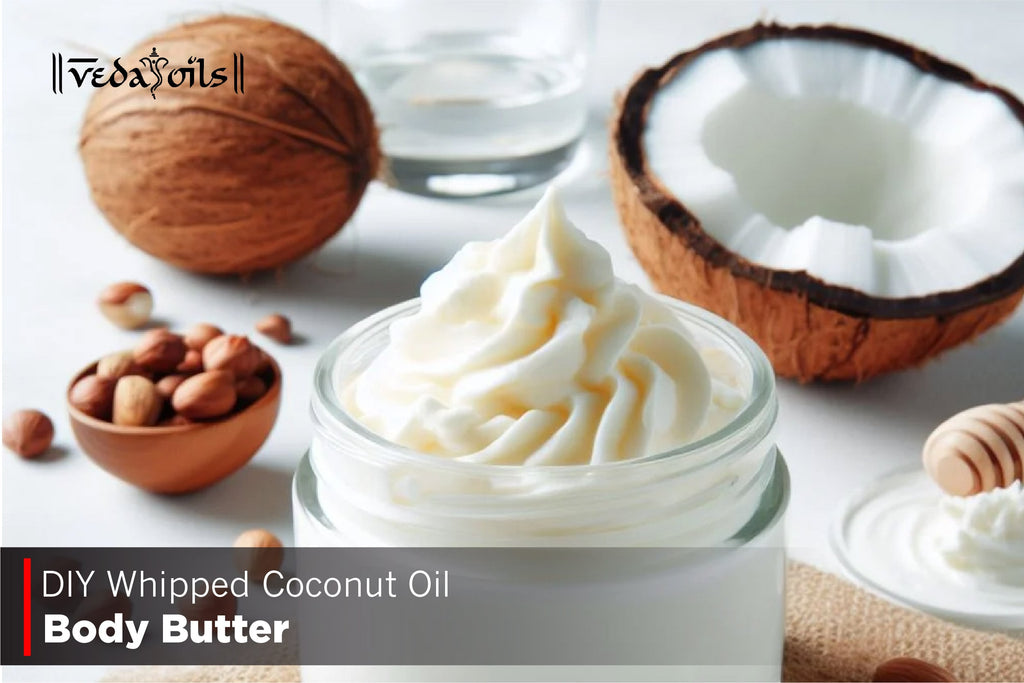We all know that you need to use a moisturizer to keep your skin and hair healthy, but which one should you use? That's what this topic on shea butter vs coconut oil is all about. For people who prefer beautiful, hydrated skin, shea butter, and coconut oil are both cult favorites.

Shea butter and coconut oil are excellent choices for naturally hydrating your skin if you have dry, eczema-prone skin that has just flared up. Let's know the difference between shea butter and coconut oil to see which is better because they are both distinct in terms of consistency and components.
What Is Shea Butter?
The kernel of the African shea tree is used to make shea butter, which is a type of fat. When raw, it typically has an ivory tint and is frequently yellow-dyed with palm or bore tutu root.
It is frequently used as a moisturizer and cosmetics product because of its high fatty acid and antioxidant content. Shea butter provides hydration and serves as the foundation for numerous homemade recipes.
What Is Coconut Oil?
The meat, milk, and wick of the coconut palm fruit are used to make coconut oil, which is used topically.

A white solid fat, coconut oil is used to moisturize dry skin, including that of those who have eczema, in warmer locations throughout the summer. decreasing inflammation, which UVB radiation may cause. fostering the healing of wounds. possessing antiviral, antifungal, and antibacterial properties.
Difference Between Shea Butter And Coconut Oil
The qualities to enhance all aspects of skin are essentially the same in shea butter and coconut oil. However, they are essentially different and can produce varying outcomes depending on the situation, so let's find out which one is preferable in this section of the post.
Shea Butter Vs Coconut Oil For Skin
A, E, and K vitamins, as well as fatty acids, are abundant in shea butter and coconut oil. Shea butter because of its light weight is preferred over coconut oil.

Additionally, they include a tonne of antibacterial, anti-inflammatory, and antifungal qualities that make them ideal substances for treating all of your skin conditions.
How To Use
Apply a few drops of coconut oil or a little amount of shea butter to your hands and warm them in your palms before using them to moisturize your skin or face.
Shea Butter Vs Coconut Oil For Hair
Without blocking hair follicles, shea butter makes sure to provide its anti-inflammatory characteristics, which help in reducing redness and scalp irritation. Shea butter also has a beard application.

Additionally, because it's natural, you may use it on any type of hair, including damaged, dry, or color-treated hair. However, coconut also has these benefits, so it depends on personal preference.
How To Use
Apply shea butter from the tips of your hair to the roots using a teaspoon of the product. 15 minutes later, rinse it off with any herbal shampoo.
Shea Butter Vs Coconut Oil For Stretch Marks
They both help to rebuild the stretched area's cells and, because of their pigmentation-reducing abilities, they also help to conceal stretch marks.

Antioxidants are present in both shea butter and coconut oil, and they are beneficial for minimizing stretch mark damage. Both of them offer healing qualities that can aid in skin restoration and hydration.
How To Use
Apply coconut oil or shea butter gently to the affected region and allow it to absorb naturally. For best results, repeat it twice each day for at least 4 weeks. Continue to become more enduring.
Shea Butter Vs Coconut Oil For Lips
The moisturizing abilities of shea butter and coconut oils are amazing for curing chapped lips. Due to the thinness of the skin on your lips, they are particularly susceptible to moisture loss.

Coconut oil provides great weather protection. Shea butter is lighter on the lips and provides the same results. Both are preferred for treating damaged, dry lips; choose one that suits you best.
How To Use
Simply apply some shea butter or coconut oil to your lips with your fingers and let it absorb naturally. Use it frequently to lessen chapped lips.
Shea Butter Vs Coconut Oil For Eczema
Both of these nutrients provide soothing relief from eczema, however, shea butter takes the lead due to its lighter composition. Coconut oil can also assist by easing the accompanying symptoms.

Your skin will feel less itchy and irritated thanks to coconut oil. Shea butter works better and reduces eczema symptoms, but since eczema is a chronic problem, neither shea butter nor coconut oil will entirely heal it.
How To Use
Add 3 tablespoons of shea butter, 2-3 drops of coconut oil, and 2-3 drops of jojoba oil should all be combined in a basin. Apply with your fingertips or a cotton swab twice a day to the skin's eczema-affected regions.
Shea Butter Vs Coconut Oil For Moisturization
Shea butter provides the skin and face with more and longer-lasting moisturization, even though coconut oil is frequently commended for being a fantastic, hydrating moisturizer.

This is because of its fatty-acid composition. These natural ingredients are utilized as humectants in many skin care products because they help seal the moisture inside the skin.
How To Use
Apply some shea butter or a few drops of coconut oil to your hands and press them together for heat; apply the solution to the region you wish to moisturize and do this twice daily for optimum results.
Shea Butter Vs Coconut Oil: Which Is Better?
The characteristics of coconut oil and shea butter are similar. Shea butter is acceptable for all skin types, however, coconut oil is not, which is the main distinction between these two moisturizers.

Coconut oil can cause clogged pores and acne breakouts in people with oily skin and sensitive skin that is prone to acne. The skin can also become oily if you use too much coconut oil. That is why not everyone should use coconut oil. However, both of these choices are wise. Shea butter, however, is always the top choice if you have to make one.
Precautions Of Using Shea Butter Vs Coconut Oil
Shea butter and coconut oil both contain calming and anti-aging qualities that could prevent aging and help skin appear smoother. Pure shea butter and virgin coconut oil on the face, however, may cause outbreaks in certain people due to allergies.
In these circumstances, even utilizing some products that merely contain a lesser amount of these chemicals may result in acne. So what do you do? To determine whether you are allergic to the ingredients or not, just perform a patch test.
Conclusion
We hope you've discovered the solution of the problem that which one to choose from shea butter vs coconut oil. Getting the purest shea butter or coconut oil is important because they both have incredible advantages for treating skin and hair. VedaOils' high-end line of skin and hair care items provides gorgeous skin and lustrous hair. Visit VedaOils.com to get shea butter and coconut oil and receive discounts on your order.
Frequently Asked Questions
Here are some frequently asked questions about Shea Butter Vs Coconut Oil:

Q.1 Does Shea Butter Have Coconut Oil In It?
Ans. Compared to coconut oil, shea butter, a fat made from the seed of the shea tree, has an extra intense moisturizing effect. Its anti-inflammatory properties make it even better at soothing inflamed skin.
Q.2 Is Shea Butter Better Than Coconut Oil?
Ans. Shea butter can be used on all skin types, but putting coconut oil on the skin can be a little hard because it can irritate certain people's skin. For skin prone to acne, coconut oil should not be used excessively because it might clog pores. So in some instances, shea butter may be superior to coconut oil.
Q.3 Is Shea Butter The Same As Coconut Oil?
Ans. Shea butter and coconut oil behave similarly, although shea butter isn't greasy whereas coconut oil is. In all other respects, they are similar in composition and offer the same vitamins, minerals, antioxidants, and fatty amino acids in varying concentrations. While both coconut and shea butter are extremely effective, choose shea butter.












 Sign in
Sign in Register now
Register now My Reward Points
My Reward Points









